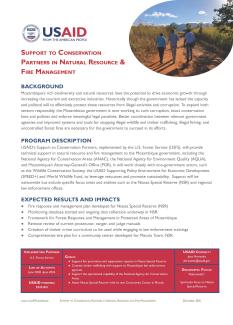BACKGROUND
Mozambique’s rich biodiversity and natural resources have the potential to drive economic growth through increasing the tourism and extractive industries. Historically though the government has lacked the capacity and political will to effectively protect these resources from illegal activities and corruption. To expand both sectors responsibly, the Mozambican government is now working to curb corruption, enact conservation laws and policies and enforce meaningful legal penalties. Better coordination between relevant government agencies and improved systems and tools for stopping illegal wildlife and timber trafficking, illegal fishing, and uncontrolled forest fires are necessary for the government to succeed in its efforts.
PROGRAM DESCRIPTION
USAID’s Support to Conservation Partners, implemented by the U.S. Forest Service (USFS), will provide technical support in natural resource and fire management to the Mozambique government, including the National Agency for Conservation Areas (ANAC), the National Agency for Environment Quality (AQUA), and Mozambique’s Attorney-General’s Office (PGR). It will work closely with non-government actors, such as the Wildlife Conservation Society, the USAID Supporting Policy Environment for Economic Development (SPEED+) and World Wildlife Fund, to leverage resources and promote sustainability. Support will be nationwide but include specific focus areas and entities such as the Niassa Special Reserve (NSR) and regional law enforcement offices.
EXPECTED RESULTS AND IMPACTS
Fire response and management plan developed for Niassa Special Reserve (NSR)
Monitoring database started and ongoing data collection underway in NSR
Framework for Forest Response and Management in Protected Areas of Mozambique
Remote review of current prosecutor, ranger, and judge manuals
Creation of timber crime curriculum to be used while engaging in law enforcement trainings
Comprehensive site plan for a community center developed for Mecula Town, NSR
| | ||
| ||

